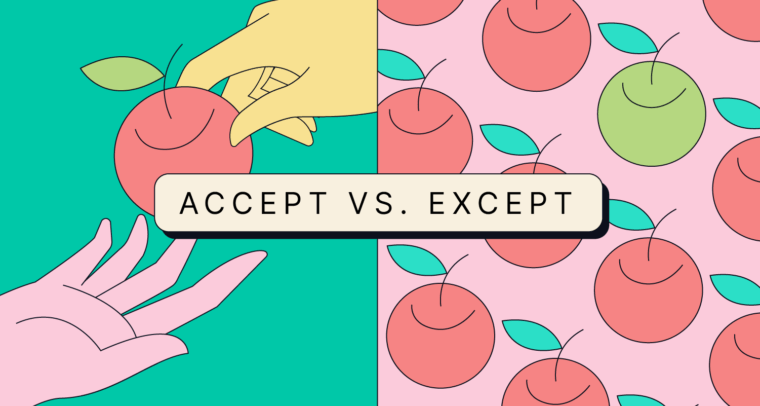
The English language has many words that are spelled or pronounced similarly. Accept and except are on the list of commonly confused words that have two very different meanings.
Below, we’ll learn their definitions and explain how to use accept and except in a sentence, to ensure you’re using the correct word in the right context.
What does accept mean?
The word accept is defined as readily receiving or taking something that’s offered. It can also be used to express approval or recognition.
In a sentence, accept is used as a verb. The opposite of accept is to refuse or reject.
What does except mean?
Except introduces a subject or context that’s being excluded, or that represents an exception to a claim.
Except can be a preposition or a conjunction. As a preposition, except means but. As a conjunction, except is often followed by that, and it means only or with the exception of. In the rare cases when except functions as a verb, it means to exclude, to object.
It’s also frequently used before conjunction words, such as if, that, or when, followed by an adverbial phrase or clause. It can also be used in the prepositional phrase except for when describing an exclusion from a sentence that includes words like all, everything, or nothing.
When to use accept vs. except
Understanding when to use accept and except in your writing ensures that you’re getting your point across clearly and correctly.
If your goal is to have your subject voluntarily receive something—whether an object or an outcome, using the verb accept is appropriate.
Except is used in a sentence when describing an element or noun that is not included.
Accept vs. except examples
Below are examples of how to use accept and except in a sentence.
Accept:
- I didn’t accept the job offer.
- Cicely accepted the slice of cake with a smile.
- We accept that you don’t want to be part of the group project.
- They won’t accept no for an answer.
Except:
- Buy all the ingredients for the recipe except milk.
- Except for the rain, the camping trip was a success.
- Everyone was having fun except Danielle, who was feeling grouchy.
- The economy was on an upward trajectory last year, except for March.
Accept and except:
- I accept the terms of the contract, except the indemnity clause.
- Except for the shrimp, they accepted all the hors d’oeuvres offered at the reception.
- Everyone accepts the decision, everyone except Brian.
- The pool is empty except for Marcy, who accepts a towel when she climbs out.
Accept vs. except FAQs
What does accept mean?
Accept means to agree or to receive something offered.
What does except mean?
Except means excluding or with the exception of.
When do I use accept vs. except?
Use accept when intending to show an action (a verb) in your writing. Use except as a preposition or conjunction to express an exclusion.






